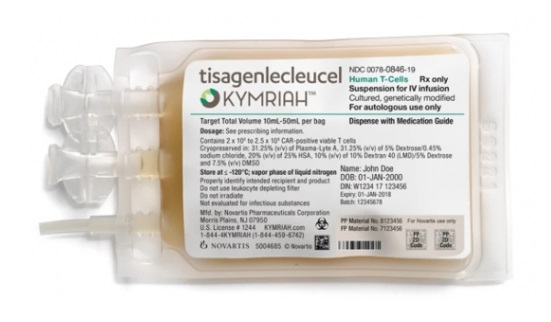
The Ministry of Food and Drug Safety (MFDS) has called for monitoring side effects in patients receiving chimeric antigen receptor T-cell (CAR-T) therapies.
On Friday, the ministry distributed a safety letter concerning CAR-T cell therapies to medical professionals, patients, and related parties. The drugs to be monitored are Janssen's Carvykti Injection (ciltacabtagene autoleucel) and Novartis' Kymriah Injection (tisagenlecleucel).
"Patients and clinical trial participants who have received these drugs need to be monitored for the development of new malignancies for a long period," the ministry said. It then stressed that patients should report any suspected adverse reactions, including T-cell malignancies, to the Korea Institute of Drug Safety and Risk Management (KIDS).
In the letter, MFDS explained that the U.S. Food and Drug Administration (FDA) published a safety advisory last Tuesday, stressing the need for caution regarding CAR-T cell therapies. The FDA said there have been reports of adverse events of T-cell malignancies following administration of CAR-T cell therapies.
The adverse events were found in clinical trials and post-marketing data.
The FDA noted that "the risk of T-cell malignancies applies to all currently approved B-cell maturation antigen (BCMA)- or CD19-targeted CAR-T cell therapies."
The U.S. regulator has also concluded that the risk of developing T-cell malignancies in patients receiving CAR-T cell therapies may occur and may lead to serious adverse events, including hospitalization and death, and is reviewing the need for further action.
In addition to Kavicty and Kymriah, which are also approved in Korea, the FDA's safety investigation includes BMS's Abecma (idecabtagene biclucel), Breyanzi (lisocabtagene maraleucel) and Gilead's Tecartus (brexucabtagene autolucel) and Yescarta (axicabtagene ciloleucel).
CAR-T cell therapies can specifically recognize and attack the surface antigens of cancer cells by introducing a gene that fuses the receptor site of immune cells (T cells) and the characteristic antigen recognition site on the surface of cancer cells into the patient's T cells.
Curocell, AbClon, Ticaros, and Eutilex are developing CAR-T cell therapies in Korea. Last month, Curocell, which is preparing to apply for a new drug license for its CD19-targeting CAR-T cell therapy candidate, Anbal-cel (anbalcabtagene autoleucel), was listed on the Kosdaq market.
Later in the day, Professor Choi Kyung-ho of the Department of Biochemistry at Seoul National University College of Medicine, also Ticaros founder and chief technology officer (CTO), expressed his opinion that it is unlikely that the lentiviral vectors used in CAR-T cell therapies are the cause of malignant tumor development.
"Gene random incorporation or insertional oncogenesis has been a concern for gene therapy for more than 20 years, but even after more than 10 years of follow-up, the cancer rate was not higher than that of normal people," Professor Choi said. “It is a factor rarely considered by the field (industry)."
Related articles
- [ESMO 2023] Has Korean CAR-T treatment Anbal-cel won the greenlight at ESMO?
- Curocell completes phase 2 study of CAR-T therapy for DLBCL
- Lawmaker casts doubt on effectiveness of 2 ultra-expensive drugs Kymriah, Zolgensma
- Bill proposed to expand medical institutions providing CAR-T treatment
- AbClon’s AC101 raises chances as 1st-line treatment for metastatic gastric cancer
- Eutilex registers patent for antibody therapy in China
- Curocell applies for expedited approval of CAR-T therapy

